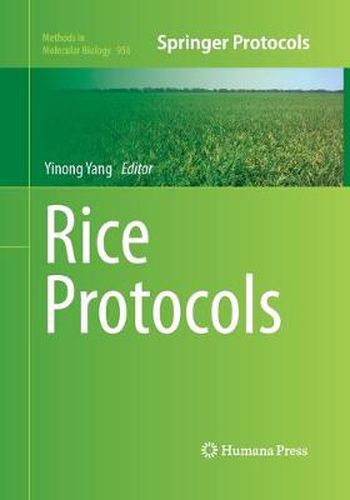Readings Newsletter
Become a Readings Member to make your shopping experience even easier.
Sign in or sign up for free!
You’re not far away from qualifying for FREE standard shipping within Australia
You’ve qualified for FREE standard shipping within Australia
The cart is loading…






This title is printed to order. This book may have been self-published. If so, we cannot guarantee the quality of the content. In the main most books will have gone through the editing process however some may not. We therefore suggest that you be aware of this before ordering this book. If in doubt check either the author or publisher’s details as we are unable to accept any returns unless they are faulty. Please contact us if you have any questions.
With the completion of a finished rice genome sequence, increasing efforts have focused on functional characterization of rice genes, elucidation of the underlying mechanisms involved in major agronomic traits (e.g., high yield, grain quality, abiotic stress tolerance, and disease resistance), and the subsequent translation of genomic knowledge into agricultural productivity via molecular breeding and improved cultural practice. To meet increasing interest in this field, Rice Protocols has been compiled to provide a series of core techniques and approaches commonly used in studying rice molecular biology and functional genomics. These approaches include genetic and molecular techniques such as artificial hybridization, fluorescence in situ hybridization, generation and characterization of chemical and T-DNA insertional mutants, quantitative trait loci (QTLs) analysis and map-based cloning, site-specific transgene integration, and artificial microRNA-mediated gene silencing, along with a variety of omics techniques. Written in the highly successful Methods in Molecular Biology ™ series format, chapters include introductions to their respective topics, lists of the necessary materials and reagents, step-by-step, readily reproducible laboratory protocols, and tips on troubleshooting and avoiding known pitfalls.
Authoritative and easy to use, Rice Protocols will prove useful for both beginners and experienced researchers whether they are molecular biologists who want to study rice plants or rice researchers who are interested in learning molecular techniques.
$9.00 standard shipping within Australia
FREE standard shipping within Australia for orders over $100.00
Express & International shipping calculated at checkout
Stock availability can be subject to change without notice. We recommend calling the shop or contacting our online team to check availability of low stock items. Please see our Shopping Online page for more details.
This title is printed to order. This book may have been self-published. If so, we cannot guarantee the quality of the content. In the main most books will have gone through the editing process however some may not. We therefore suggest that you be aware of this before ordering this book. If in doubt check either the author or publisher’s details as we are unable to accept any returns unless they are faulty. Please contact us if you have any questions.
With the completion of a finished rice genome sequence, increasing efforts have focused on functional characterization of rice genes, elucidation of the underlying mechanisms involved in major agronomic traits (e.g., high yield, grain quality, abiotic stress tolerance, and disease resistance), and the subsequent translation of genomic knowledge into agricultural productivity via molecular breeding and improved cultural practice. To meet increasing interest in this field, Rice Protocols has been compiled to provide a series of core techniques and approaches commonly used in studying rice molecular biology and functional genomics. These approaches include genetic and molecular techniques such as artificial hybridization, fluorescence in situ hybridization, generation and characterization of chemical and T-DNA insertional mutants, quantitative trait loci (QTLs) analysis and map-based cloning, site-specific transgene integration, and artificial microRNA-mediated gene silencing, along with a variety of omics techniques. Written in the highly successful Methods in Molecular Biology ™ series format, chapters include introductions to their respective topics, lists of the necessary materials and reagents, step-by-step, readily reproducible laboratory protocols, and tips on troubleshooting and avoiding known pitfalls.
Authoritative and easy to use, Rice Protocols will prove useful for both beginners and experienced researchers whether they are molecular biologists who want to study rice plants or rice researchers who are interested in learning molecular techniques.